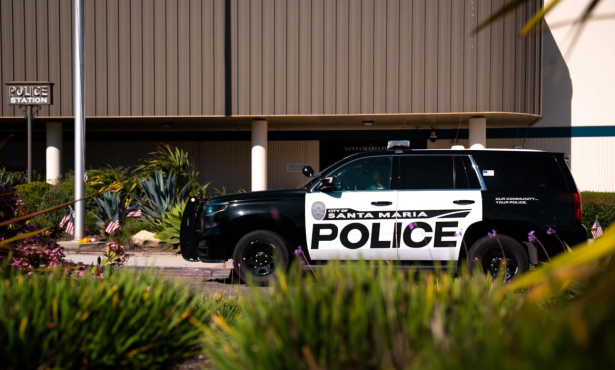Public Nuisance Number One?
City Hall Throws Book at Landlord Dario Pini
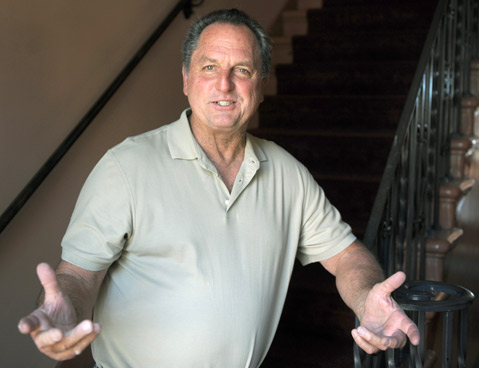
After months of inspections and legal preparation, Santa Barbara’s City Attorney Steve Wiley lowered the boom on one of the biggest landlords on the South Coast last week, charging previously convicted slumlord Dario Pini with enough Health and Safety Code violations that Pini could find himself looking at combined penalties of $16,400 for every day they occur.
While the size of the potential fine is eye-catching, Wiley and Pini have been playing cat-and-mouse over the conditions of Pini’s apartments ever since the early 1990s. What’s new is that Wiley is now asking a Superior Court judge to grant City Hall authority to make all necessary repairs to bring 26 of the 100 rental properties Pini owns within city limits up to code if Pini doesn’t make them himself. For its efforts, City Hall would send Pini a bill. Newer still is Wiley’s demand that Pini’s properties be placed in a receivership to be administered by a court-appointed third party. In Santa Barbara, that’s never been done before.
Wiley explained there was no “light-bulb moment” inspiring so dramatic a legal action. “We get lots of complaints from Dario’s tenants. We get lots of complaints from his neighbors. And we always have a handful of enforcement actions going against him,” Wiley said. “Every few years, you have to do something to get his attention.”
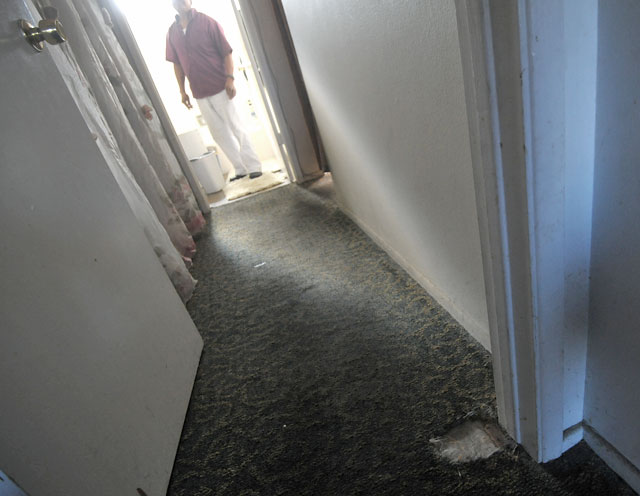
This, it appears, has worked. Pini and his attorney Larry Powell are now pressing Wiley for a sit-down meeting to discuss an accelerated repair schedule. Wiley said he’s willing to meet, but only on the condition that a judge is authorized to find Pini in contempt of court if he doesn’t do the repairs in a timely fashion.
In a recent interview, Pini stressed he’s already begun taking remedial steps. In the instance of an East Gutierrez Street address with two illegal rental units located in the crawl space under the building, Pini said he immediately cleaned up all the problems cited by city inspectors on July 12 and has the signatures of those inspectors on the paperwork to prove it. (The ceiling height of the crawl space rooms was six to seven feet.) Pini said many of the allegations leveled against him stemmed from inspections that took place this July. “That’s six months ago,” he said. “That’s a long time to wait if the problems were really that dangerous.”
Wiley isn’t saying anyone got injured from living in Pini’s properties, just that the accommodations constitute a “public nuisance” to Pini’s tenants and to their neighbors. The lawsuit alleges that balconies, garages, dining rooms, living rooms, and even kitchens in Pini’s properties have been converted to sleeping quarters. Bedrooms have been illegally subdivided. Yards overflow with an abundance of uncollected trash. Driveways are occupied by RVs and campers that are rented out. The vans in the parking lot at one property are allegedly used for prostitution. In one attic, there’s an active beehive; in one interior hallway, there’s a refrigerator small, untended kids can climb into. Smoke detectors are conspicuous by their absence; exposed wires conspicuous by their presence. In one, the odor of raw urine and fecal matter is inescapable. Junk is everywhere. At several, the lawsuit alleges, front yards have been converted to construction staging areas with mounds of lumber and other building materials. At some, doors are broken, drains don’t work, and tarps substitute for functioning roofs.
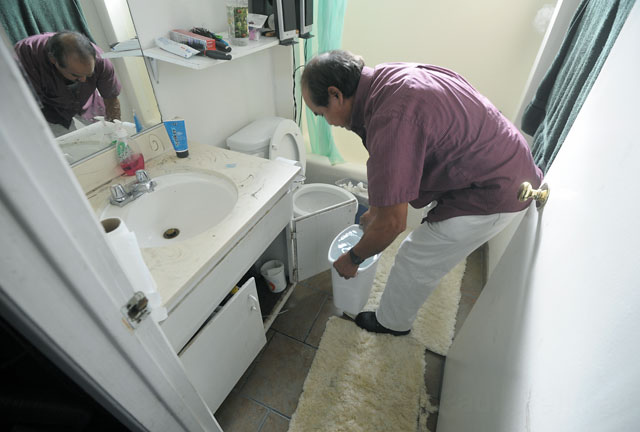
A onetime minor league ballplayer from the Bay area, Pini has been renting real estate in Santa Barbara since the late 1970s. The child of Italian immigrants himself, Pini said he empathizes with newcomers trying to make it in the United States — the gardeners, the maids, and the bus boys — and wants to help them out. To that end, he’s been willing to rent to people many other landlords simply won’t — large families living on the economic edge. It’s proven to be a sizable market niche, and Pini’s holdings have mushroomed over the years.
Today, Wiley estimates Pini owns 1,500 rental units, roughly 5 percent of Santa Barbara’s entire rental market. Even tenants-rights advocates who’ve grumbled at the squalid conditions of Pini’s apartments conceded that he’s proven consistently flexible when dealing with renters down on their luck and behind on their rent. Pini isn’t in the charity business, however, and his rents are hardly low. He asks $1,250-$1,550 for a one-bedroom apartment. The only way Pini’s typical tenants can pay that, Wiley said, is by cramming as many people in as possible. And that’s where the trouble begins.
Pini said he’s getting a better handle on his properties. He’s now requiring anyone staying in his units to be on the lease. But he’s also quick to suggest his critics might have unsavory motives. “Nobody’s prejudiced here. Everybody loves everyone else,” he said, “until they move in next door to them.” Pini said he also rents to many city college students, but that he doesn’t get nearly as many complaints about this “clientele.”
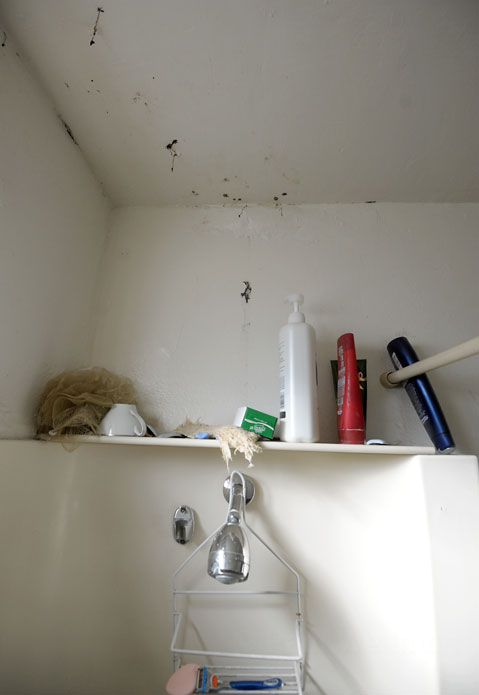
The recession, Pini said, has been especially hard on his tenants. Recent years have also been tough on him. He took a bath in Las Vegas, buying four apartment complexes — that’s 1,000 units — at the height of the real estate market. The City of Oxnard recently went after Pini for $100,000 in bed taxes it claimed he didn’t pay on hotel rooms he’d been renting out as apartments. He got hammered in Santa Maria by a tenants-rights group who sued him for $1 million over habitability issues. And the City of Santa Barbara dinged him for $45,000 earlier this year for operating rental units at the bottom of Chapala Street as de facto hotels. Loud and rowdy Exxon workers he’d rented to there intruded upon the peace and quiet of well-heeled residents, otherwise entranced by the cozy seaside charm of the West Beach neighborhood.
The police cracked down by holding two neighborhood meetings, both conspicuously attended by members of the City Council. Through it all, Pini has been remarkably congenial, direct, and responsive. But, said Wiley, that’s standard operating procedure for Pini. “He always says, ‘I’m on it.’ And he means it,” Wiley said. But when the heat disappears, Wiley said, so does Pini.
For Wiley, the issue is simply a matter of upkeep, maintenance, and repair. In the early 1990s, Wiley successfully prosecuted Pini on similar grounds. Then, Pini famously declined to serve time in one of his units, preferring instead to be sentenced to County Jail. Regardless, Pini is equally notorious for the long hours he puts in. Despite his vast real estate holdings, Pini personally responds to complaints at all hours of the night. He even pays an employee to keep an ear peeled to the police scanner for trouble at his units; cops say that by the time they show up, Pini is often already there.
Pini insists he has a workforce of 30-40 maintenance workers ready, willing, and able to respond. “Obviously that’s not enough,” Wiley retorted. “The fact is, he isn’t devoting the resources he needs to get the job done.” In an ideal world, Wiley said, Pini would retire, enjoy his wealth, and hire someone else to manage his properties. But that, said Pini’s attorney Larry Powell, is not in Pini’s character. “This guy is not a pink shirt and penny loafer guy; he works 60 hours a week,” Powell said. “That’s just what Dario does.”


